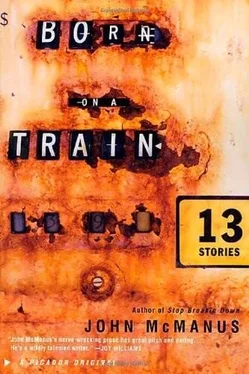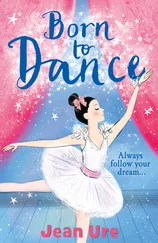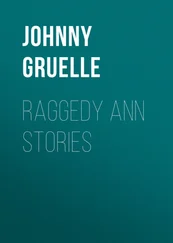Do you remember Snarly? Letitia said to Wendy, who was holding her lower lip to stop its quivering.
Wendy shook her head. Was that a boy you took to the school dance?
Snarly was my calico.
A calico can’t be a boy, said Wendy.
Snarly was a girl, Letitia said. She had that bony litter Carrot drowned. Carrot was their younger brother, the only one of four who still was living. He was too young to have been Letitia’s friend; he grew up in the fifties, when things were more fun, when girls got to wear pants, when Carrot and the other boys played cowboys and Indians in the field and hollered names of horses, names of guns, but Letitia was a mother by then, and working, and she didn’t care anymore what clothes she wore.
Carrot did no such thing, said Wendy.
Black ones. He tied them in a burlap sack and drowned them.
Wendy shook her head. The Probe that nearly scraped against her door was black, with neon plates.
You don’t believe me, said Letitia.
It’s not a very nice thing to remember.
I can’t help what I remember.
I don’t see why not, said Wendy. I’d forgotten those cats were even there.
But every barn’s got cats, Letitia said. You know the barn, don’t you?
I suppose so, Wendy said. What did it look like?
Big, and new.
What color was it?
Red, but then it faded, said Letitia.
What did we look like?
Like that, Letitia said. She pointed at the girl who lay in clovers now with a kitten on her chest, cradled like a nursing baby. It was a Siamese mix but gray from tabby blood; it swatted at the girl’s ears and touched its nose to hers and clawed her chin, and Wendy, her brown eyes squinting south to where her sister’s finger gestured, said, It’s just a parking lot.
But the girl on the grass.
I don’t know how you see that far, said Wendy. I don’t see a girl. I don’t even see grass.
It’s there.
I didn’t say it’s not there, Wendy said. I said I didn’t see it.
The girl was picking clovers now, looking for one with four leaves. Letitia blinked her eyes, because her vision wasn’t any better than her sister’s. She was starting to feel uneasy; she was perspiring. She didn’t understand why Wendy saw a different picture of the land beside the highway. The field was blurry at the edges of Letitia’s thick trifocals but the girl’s face was sharp and clear; she stood and took her shirt off, unaware of any interstate above her. She swayed and moved her body like a wand. Letitia tried to remember how it had felt to move like that. She touched her arm and smiled.
We’ll die here, Wendy said.
We were born here, said Letitia.
I’m sure it was at least a mile west.
But I can see the watermelon patch, Letitia said. Where the girl was walking now, kicking at rindy galls amidst the brambles, where she traveled from the barn across a wispy-flowered slope to reach the tanbark trail where she rose up closer to the road, where she ran her gentle fingers through her hair and walked up trickly dogwood roots and when she came up to their vehicle Letitia was transfixed; Letitia touched her sister’s hip and said, We looked like that. That was us.
Wendy looked right through the girl’s head and said, We looked like Best Buy?
Letitia was sweating. She didn’t know what to say.
The girl’s legs were bonded with the guardrail now. It was a solid metal rail. It grew right through her ankles.
Letitia blinked her eyes. She wiped her glasses on her blouse.
I can barely see cars in the parking lot, said Wendy. It’s all a blur.
When Letitia donned her glasses again, the grass she saw was green and gray at once. It had a coat of many colors, made of metal.
The girl shifted in and out of focus. Kids these days all look the same, said Wendy. Letitia shifted in her seat uncomfortably and touched her three chins all at once and didn’t know which one was real, which ones were only fat deposits, until the girl touched her own chin with an aster so that Letitia’s top one itched and tickled. She sneezed as the girl sneezed. The girl walked into their car and through their bodies and stopped inside Letitia, where she bent to pluck a four-leaf clover from the earth.
From this valley they say you are going, she sang. We will miss your bright eyes and sweet smile.
The rush of cars on the interstate was quieting. Letitia heard no sound except her body’s learning how it had felt once, how it used to move, the fraction of herself she used to occupy. When the girl rose and took another step, Letitia’s newfound knowledge vanished; it sounded like a balloon deflated just too far to pop. Tractor-trailers ground their gears inside her ear canals. She saw no grass. The girl skipped away and galloped toward the barn, and fast-food logos rose into the dusk like pony sticks.
It was a five-leaf clover, said Letitia, but she wondered for a moment where she was. I remember now, she said. It was like the blades of a star.
There’s no such thing as a five-leaf clover, Wendy said.
But I found one, said Letitia.
Then it was a completely different kind of weed.
The ground was thick with clover, said Letitia. It was nothing else.
Anyway, a five-leaf clover would be unlucky, Wendy said, if such a thing existed.
It’s double the luck, Letitia said.
No, it’s like a double negative, Wendy said. It’s bad.
But it’s not negative to begin with. It’s positive.
Wendy sighed and coughed and tried to stretch the cramps out of her legs. I never saw what the hell was lucky about four-leaf clovers, she said. They’re mutants. They’re deformed. They’re like babies born retarded.
They’re pretty, said Letitia.
That’s the real reason people pick them, Wendy said. To kill them. To put them out of their misery.
Wendy, a clover doesn’t have any misery.
Wendy shook her head. You’re right, she said. Not when it’s dead. The neon signs of restaurants and hotels went dark. Their extinguishing caught Letitia’s eye, and grass grew once again and this was no bridge; it was the top of a gentle slope beside a copse of trees, and Wendy frowned and didn’t see the girl tear a leaf from her clover to make its number four.
No, she said.
Yes, said Wendy, her voice soft like it was far away.
Sixty years and Letitia still remembered how she’d robbed the clover of its symmetries. She’d thought the four leaves might spread out to fill the fifth’s space, but they didn’t move at all; she’d killed them, marred their form with a cavity. She pocketed the broken leaf inside her dress and looked for where she’d picked it from the ground. When she found a thumbnail patch of dirt between two buttonflowers, Letitia tensed her jaw and yelled, In me. You picked it here, in me, but she couldn’t bridge their senses; the girl heard nothing, only placed the stem upright in dirt and stood and faced the west and never felt two lanes of eastbound traffic enter her and leave again so quickly, their engines hot, their pistons firm. She walked away. She felt sad about the clover, but she wasn’t going to cry, not about plants, nor leaves; not anything. Wendy was the only one who ever cried, even though she said emotions were stupid, only told the body when to eat, when to use the bathroom.
Letitia had lain down on the grass and watched the clouds go by. She’d leaned her head far back to see how round the earth was, perfect like a clock face, and she hadn’t known what lanes she lay across, or why the ground had always rumbled since she’d first gone out to wander through her father’s fields. Why amidst the pasture’s eerie silence she was touched by angry energies, minds jacked up by coffee, drivers who hated one another. She felt uneasy when she dug a hole for her uprooted clover, but she never learned until the ninth of September, 1999, what irate brutes were struggling through her body to be born.
Читать дальше












